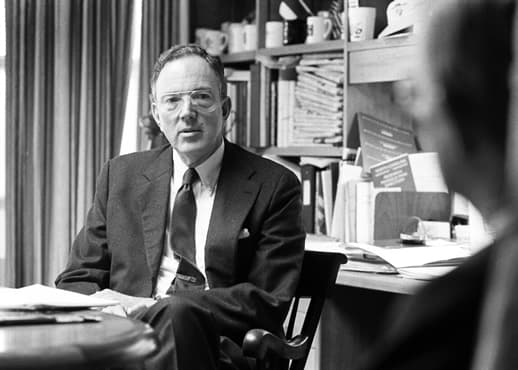
The campus community at UNC Charlotte is honoring the life of chancellor emeritus E.K. Fretwell Jr., who died Oct. 18 at the Stewart Health Center of the Cypress. He was 88.
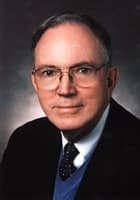 At 6-foot-7, Fretwell was an imposing figure as he walked across the UNC Charlotte campus, stopping often to chat with students, faculty or staffers. His life was devoted to education, and he taught at virtually every level in a distinguished career that spanned more than four decades.
At 6-foot-7, Fretwell was an imposing figure as he walked across the UNC Charlotte campus, stopping often to chat with students, faculty or staffers. His life was devoted to education, and he taught at virtually every level in a distinguished career that spanned more than four decades.
A large measurement of Fretwell’s legacy evolved out of his lifelong curiosity about other countries and cultures. During his tenure as chancellor at UNC Charlotte, bilateral institution exchange agreements were forged between the University and prestigious universities in England, France, Germany and Taiwan.
And during a period when diversity did not have the same academic priority as it does today, Fretwell set the stage for UNC Charlotte to become a truly diverse, open and multicultural public university.
Under his leadership, UNC Charlotte’s international student population grew to 3 percent of the undergraduates - the highest of any of the UNC System institutions, including UNC Chapel Hill and North Carolina State University.
In addition, minority enrollment rose to 9.1 percent of the student body. But Fretwell didn’t stop there. He also diversified the university’s top administration, naming minorities to key leadership positions.
“Much of the physical and academic infrastructure that set the stage for UNC Charlotte's rapid growth was set in place by E.K. during his remarkable 10.5 years as our second chancellor,” said Chancellor Philip L. Dubois. “And his leadership of major higher education associations expanded our national reputation at the same time. All 49ers are in his debt. “
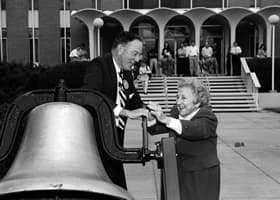 Born in New York City in 1923, UNC Charlotte was an unlikely career destination for Fretwell, who graduated from Wesleyan University in Connecticut in 1944 and earned his M.A. in Teaching from Harvard in 1948 and his Ph.D. from Columbia in 1953.
Born in New York City in 1923, UNC Charlotte was an unlikely career destination for Fretwell, who graduated from Wesleyan University in Connecticut in 1944 and earned his M.A. in Teaching from Harvard in 1948 and his Ph.D. from Columbia in 1953.
He also has some unusual career stops. In 1944-45 he served with the American National Red Cross. After World War II, he was appointed a vice consul at the newly reopened American Embassy in Prague.
Fretwell started off as a classroom teacher in Brookline, Mass., before he became a high school and community college teacher in Evanston, Ill. Later he was a university graduate faculty member at Columbia and the University of California at Berkeley.
Administrative posts included New York State’s Assistant Commissioner for Higher Education, University Dean for Academic Development (City University of New York), and President of the State University College at Buffalo.
In 1979, Fretwell came to the attention of Charlotte bank executive C.C. Cameron, who headed the search committee looking for the right person to succeed Dean Colvard, who was UNC Charlotte’s first chancellor.
“He was the right man at the right time in the history of our university,” Cameron said later. “As a result of his ties and connections to educational organizations all over the country, he helped us to become recognized nationwide and, to some degree, internationally as an outstanding university.”
In his installation address, Fretwell laid out his vision for UNC Charlotte.
As a modern metropolitan university, it would embody “a spirit of service,” expanding its commitment to serve more students and the future civic needs of the Charlotte region. Yet, the university would continue to emphasize recognized values of the arts and sciences.
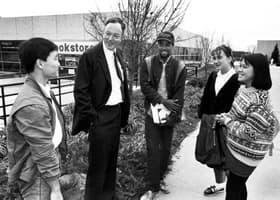 He proposed an honors program and emphasized UNC Charlotte’s responsibility to encourage qualified women and minorities who might not otherwise consider higher education to attend college.
He proposed an honors program and emphasized UNC Charlotte’s responsibility to encourage qualified women and minorities who might not otherwise consider higher education to attend college.
As he had done previously at the City University of New York system and later as president of the State University of New York College at Buffalo, Fretwell successfully attracted under-represented populations to UNC Charlotte.
“Achieving more diversity always had been one of my fundamental goals,” he said at the time.
Two of Fretwell’s biggest achievements were the expansion of the UNC Charlotte Urban Institute and the realization of University City. Both were visions of Colvard.
During Fretwell’s watch, UNC Charlotte expanded its relationships with local community colleges, established more connections with businesses, updated continuing education and produced a state economic forecast. UNC Charlotte also addressed K-12 needs with enrichment and summer programs, and teacher workshops and seminars.
Fretwell also managed the growth of the master’s programs at UNC Charlotte, including new degrees in computer science, nursing and reading education. In addition, the university began cooperative doctoral programs in engineering with N.C. State University and in school administration with UNC Chapel Hill.
In the decade that he led the university, freshman SAT scores rose and honors housing began. Enrollment soared nearly 50 percent to almost 13,000 students – 2,000 of them graduate students.
He did not slow down after he retired.
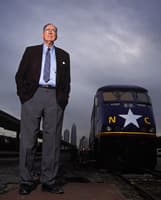 Fretwell was appointed in 1993 by former Gov. James B. Hunt, Jr. to serve as chair of the North Carolina Education Standards and Accountability Commission, which consisted of 25 citizen members. The Commission was charged by the Legislature to identify what a North Carolina high school student should know and be able to do and to suggest appropriate assessment procedures.
Fretwell was appointed in 1993 by former Gov. James B. Hunt, Jr. to serve as chair of the North Carolina Education Standards and Accountability Commission, which consisted of 25 citizen members. The Commission was charged by the Legislature to identify what a North Carolina high school student should know and be able to do and to suggest appropriate assessment procedures.
In 1998, he completed a 10-month term as interim president of the University of North Florida. Prior to that, he served as interim president of the five-campus University of Massachusetts System.
In North Carolina, he was appointed to boards concerned with improved transit and railroad history He also served on the North Carolina Medical Board and the Charlotte Symphony Board. He is a former president of the Rotary Club of Charlotte and of the Mecklenburg Boy Scout Council.
He and his wife, Dorrie, moved to The Cypress, a retirement center in south Charlotte, in December, 1999. She passed away on December 30, 2011. They have four grown children and seven grandchildren. An avid walker, he enjoyed an interest in national and international railroads.